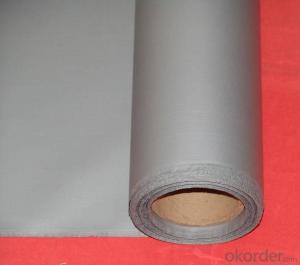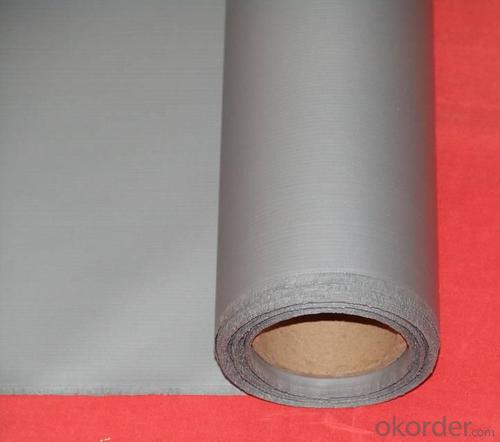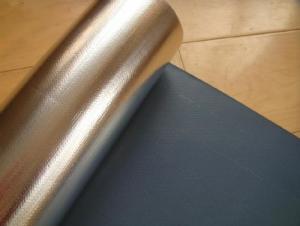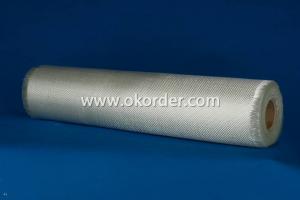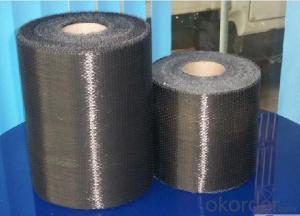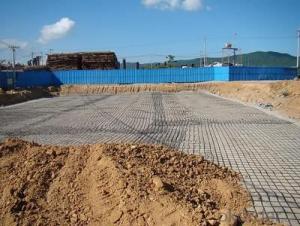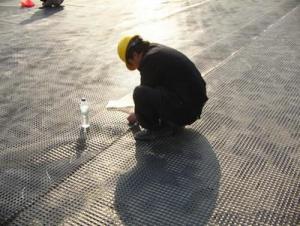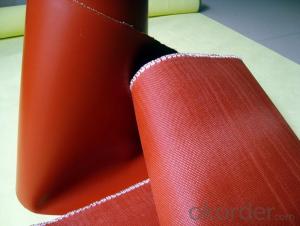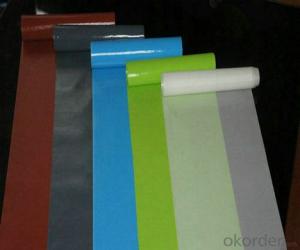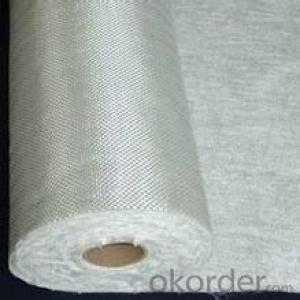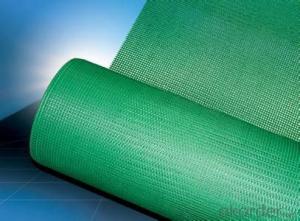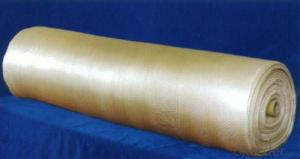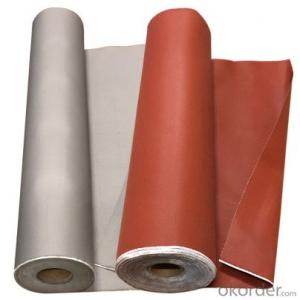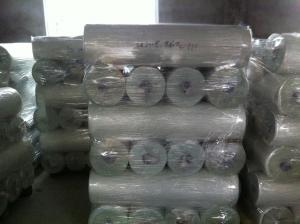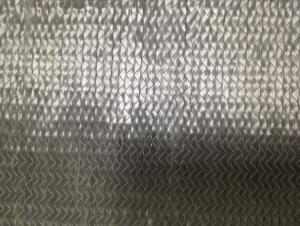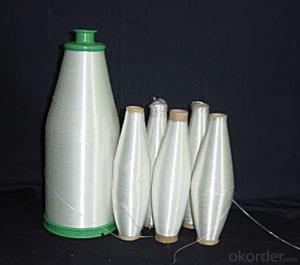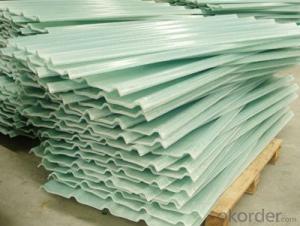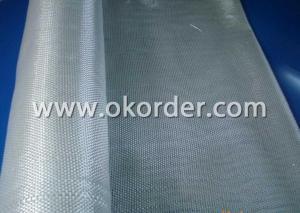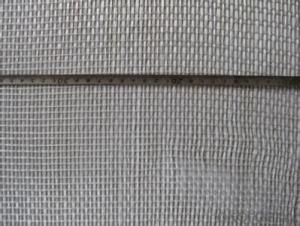Silicon Coated Fiberglass Fabric
- Loading Port:
- Shanghai
- Payment Terms:
- TT OR LC
- Min Order Qty:
- 10000 m²
- Supply Capability:
- 500000 m²/month
OKorder Service Pledge
OKorder Financial Service
You Might Also Like
high mechanical strength,good heat and color resistance,good sealing property,resistance to many common chemical
Properties:
1. Service Temperature -70~300
2. Ozone, oxide, light and weathering aging resistance, excellent weather ability used in outdoors and ages may be reached to 10 years.
3. High insulation: Dielectric constant from 3 to 3.2, breakdown voltage from 20 to 50KV/mm
4. Physical and chemical properties.
Application:
1) Electric insulation: Silicone rubber coated fiberglass cloth features high grade of electric insulation and bear a load of high voltage. It fits for making products like insulation cloth and sleeves
2) Non-metallic compensator: Used as pipeline flexible coupling, non-metallic compensator helps to avoid damage caused by heat expansion and cold contraction. This membrane material specially fit for use in industries of petroleum, chemical engineering, cement, iron and steel and energy sources due to its special features of temperature resistance, anti-corrosion, anti-aging, and good elasticity and toughness
3) Anti-corrosion sector: It is good to be used as inner and outer anti-corrosion layer featuring excellent corrosion resistance, temperature resistance and high strength. It proves to be an ideal anti-corrosion material
4) Others: Apart from above application, it can also be used as sealing material, temperature resistant and anti-corrosion conveyer belt, as well as packaging material.
| model | Thickness(mm) | Thickness(mil) | Breaking Strength(n/50mm) | Bursting Strength | Combustible | width |
| KQ-10 | 0.15 | 6 | 1500/1200 | 2.0 | ≤ 25% | 0-1500mm |
| KQ-20 | 0.25 | 10 | 1800/1500 | 2.1 | ≤ 25% | 0_ 1500mm |
| KQ-30 | 0.40 | 16 | 2000/1600 | 2.2 | ≤ 25% | 0_ 1500mm |
| KQ-40 | 0.50 | 20 | 2200/1800 | 2.3 | ≤ 25% | 0_ 3000mm |
| KQ-50 | 0.60 | 24 | 2400/2200 | 2.4 | ≤ 25% | 0_ 3000mm |
| KQ-60 | 0.70 | 28 | 2500/2300 | 2.4 | ≤ 25% | 0_ 3000mm |
| KQ-70 | 0.80 | 31 | 2600/2400 | 2.5 | ≤ 25% | 0_ 3000mm |
| KQ-80 | 0.90 | 35 | 2800/2600 | 2.5 | ≤ 25% | 0_ 3000mm |
| KQ-90 | 1.00 | 40 | 3000/2800 | 2.6 | ≤ 25% | 0_ 3000mm |
| KQ-11 | 1.20 | 47 | 3400/3000 | 2.5 | ≤ 25% | 0_ 3000mm |
| KQ-12 | 1.50 | 59 | 3700/3300 | 2.8 | ≤ 25% | 0_ 3000mm |
| KQ-13 | 2.00 | 79 | 4200/3800 | 3.5 | ≤ 25% | 0_ 3000mm |
| KQ-14 | 3.00 | 118 | 6500/6200 | 5.0 | ≤ 25% | 0_ 1000mm |
- Q: The thickness of the stone concrete protection layer on the waterproof layer shall not be less than mm.
- Fine stone concrete roofing waterproof layer on the protective layer thickness of not less than 40mm, the basement of fine stone concrete roof waterproofing layer on the protective layer thickness of not less than 70mm, the fine stone concrete basement floor of the protective layer thickness should be greater than 50mm.
- Q: Are there any specific safety precautions to consider when working with fiberglass fabrics?
- Yes, there are specific safety precautions to consider when working with fiberglass fabrics. Fiberglass can release tiny, sharp fibers that can irritate the skin, eyes, and respiratory system if inhaled. Therefore, it is important to wear protective clothing, gloves, goggles, and a mask to minimize exposure. Additionally, working in a well-ventilated area or using proper respiratory protection is recommended to prevent the inhalation of any airborne fibers.
- Q: What's the difference between double faced fiberglass clad laminate and double faced copper clad laminate?
- Epoxy glass fiber cloth substrate, epoxy glass fiber cloth substrate, is a kind of substrate which uses epoxy resin as adhesive and uses electronic grade glass fiber cloth as reinforcing material. Its bonding sheet and inner core copper clad laminate are important substrates for making multilayer printed circuit boards.
- Q: Are fiberglass fabrics suitable for use in the transportation industry?
- Yes, fiberglass fabrics are suitable for use in the transportation industry. Fiberglass is a lightweight, yet strong and durable material that offers several advantages for various applications in transportation. One of the key benefits of fiberglass fabrics is their high strength-to-weight ratio. This makes them ideal for use in the construction of vehicles, such as cars, boats, and aircraft, where reducing weight is crucial for fuel efficiency and performance. Fiberglass fabrics are also known for their excellent impact resistance, which can help enhance the safety of transportation systems. Additionally, fiberglass fabrics have high heat resistance properties, making them suitable for use in the transportation industry. They can withstand extreme temperatures without losing their structural integrity, which is particularly important in applications such as automotive exhaust systems, where high temperatures are generated. Furthermore, fiberglass fabrics offer good electrical insulation properties, making them useful in the manufacturing of electrical components and systems within vehicles. This ensures the safety and reliability of electrical connections, reducing the risk of short circuits or electrical failures. Moreover, fiberglass fabrics are highly corrosion-resistant, making them ideal for use in marine transportation and other applications where exposure to moisture and saltwater is common. This extends the lifespan of transportation equipment and reduces maintenance costs. In summary, fiberglass fabrics possess numerous qualities that make them well-suited for use in the transportation industry. Their lightweight, high strength-to-weight ratio, impact resistance, heat resistance, electrical insulation properties, and corrosion resistance make them a reliable and versatile choice for various transportation applications.
- Q: Can fiberglass fabric be used for filtration?
- Indeed, filtration purposes can be achieved using fiberglass fabric. Renowned for its robustness, longevity, and resistance to chemicals, fiberglass fabric emerges as an optimal material for filtration applications. Its utilization is prevalent across sectors such as water treatment, oil and gas, pharmaceuticals, and food processing. Fiberglass fabric assumes the role of a filtering medium, proficiently eliminating impurities, solid particles, and contaminants from liquids or gases. Its intricate network of delicate fibers effectively ensnares and retains particles of diverse sizes, culminating in an efficacious filtration process. The paramount advantage of fiberglass fabric in filtration lies in its capacity to endure high temperatures. It exhibits resilience in extreme thermal conditions, rendering it suitable for scenarios necessitating the filtration of corrosive or hot fluids. Moreover, fiberglass fabric can be tailor-made to match specific filtration requisites. It can be subjected to coatings or treatments with a variety of substances to enhance filtration efficiency, augment chemical resistance, or confer water repellency. In summary, fiberglass fabric stands as a versatile material, proficiently employed for filtration purposes owing to its durability, temperature resistance, customization potential, and strength.
- Q: How to distinguish carbon fishing rod?
- Carbon poles have electricity proof signs, glass steel poles do not have.
- Q: Can fiberglass fabrics be used for insulation in aerospace components?
- Yes, fiberglass fabrics can be used for insulation in aerospace components. Fiberglass is known for its excellent thermal insulation properties and is widely used in various industries, including aerospace. It is lightweight, flexible, and can withstand high temperatures, making it suitable for insulating different aerospace components such as engine compartments, fuel tanks, and exhaust systems. Additionally, fiberglass fabrics are resistant to chemicals, moisture, and fire, which further enhance their suitability for aerospace insulation applications.
- Q: How is fiberglass fabric cut?
- Fiberglass fabric is typically cut using specialized tools such as scissors, utility knives, or rotary cutters. The fabric is laid flat on a cutting surface, and the desired shape or size is traced onto it. The cutting tool is then used to carefully follow the traced lines, ensuring a clean and precise cut. It is important to use sharp tools and take safety precautions due to the fibrous nature of the fabric.
- Q: Is fiberglass fabric resistant to chemicals in laboratories?
- Yes, fiberglass fabric is generally resistant to a wide range of chemicals commonly used in laboratories. Its inherent chemical resistance makes it a preferred material for protective clothing, lab aprons, and other applications where exposure to chemicals is expected.
- Q: Can fiberglass fabric be used for reinforcement in sporting goods?
- Yes, fiberglass fabric can be used for reinforcement in sporting goods. Fiberglass fabric is known for its high strength-to-weight ratio, making it an ideal choice for reinforcing various sporting goods such as surfboards, kayaks, canoes, skis, and even hockey sticks. The fiberglass fabric is typically used in conjunction with epoxy resin to create a strong and durable composite material. The fabric is impregnated with resin and then layered onto the desired area, providing additional strength and stiffness to the sporting goods. This reinforcement helps to improve the overall performance and longevity of the product. Additionally, fiberglass fabric is corrosion-resistant, lightweight, and has excellent impact resistance, making it a popular choice for reinforcing sporting goods.
Send your message to us
Silicon Coated Fiberglass Fabric
- Loading Port:
- Shanghai
- Payment Terms:
- TT OR LC
- Min Order Qty:
- 10000 m²
- Supply Capability:
- 500000 m²/month
OKorder Service Pledge
OKorder Financial Service
Similar products
Hot products
Hot Searches
Related keywords
